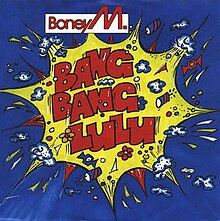My Lula Gal
| "Bang Bang Lulu" | ||||
|---|---|---|---|---|
 |
||||
| Single by Boney M. | ||||
| from the album Eye Dance | ||||
| Released | June 1986 | |||
| Format | 7" Single, 12" Single | |||
| Recorded | 1985 | |||
| Genre | Pop | |||
| Length |
3:31 (7" mix) 3:58 (12" mix) |
|||
| Label |
Hansa Records (FRG) Carrere (UK) |
|||
| Songwriter(s) | Traditional, Frank Farian | |||
| Producer(s) | Frank Farian | |||
| Boney M. singles chronology | ||||
|
||||
"Bang Bang Lulu" is a traditional American song with many variations. It derives from older songs most commonly known as "Bang Bang Rosie" in Ireland, "Bang Away Lulu" in Appalachia, and "My Lula Gal" in the West. The form "Bang Bang Lulu" became widespread in the United States from its use as a cadence during the World Wars. The song uses the tune of "Goodnight, Ladies".
All versions concern a woman and her various lovers. The early forms were sometimes very directly crude, violent, or infanticidal. Published versions probably drastically understate the song's popularity, particularly since the first mentions allude to 78 or 900 additional verses unfit for printing. Robert Gordon, the first head of the Library of Congress's Archive of American Folk Song, included his variants of Lulu among the "Inferno" section which was excluded from the library's general collection for its "bawdy and scatological subject matter".
One verse appeared in Owen Wister's 1902 novel The Virginian:
Nine appeared in Carl Sandburg's 1927 American Songbag among its "Railroad and Work Gangs" songs, including Wister's and:
Sandburg credited many of the verses he knew as derived from the 17th-century Scotch song "Way Up on Clinch Mountain", now usually known as "Rye Whiskey".
Roy Acuff and his Crazy Tennesseans recorded "When Lulu's Gone" under the pseudonym of the Bang Boys in 1936. Another version—"Lulu"—was recorded by Oscar Brand on his 1958 Old Time Bawdy Sea Shanties. Verses from this song also developed into "Roll in My Sweet Baby's Arms", recorded by Bill Monroe and Flatt & Scruggs and many others after them.
...
Wikipedia
